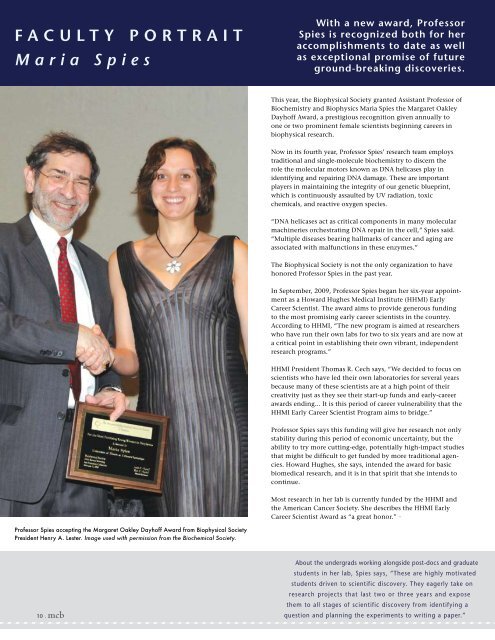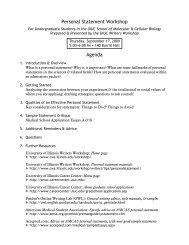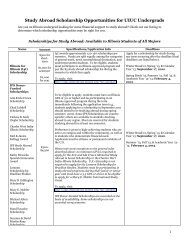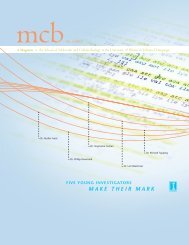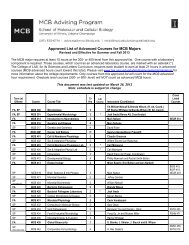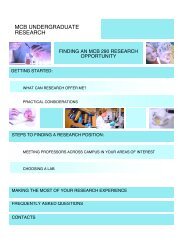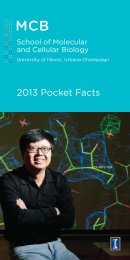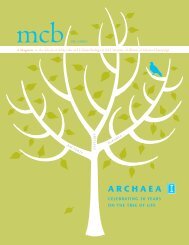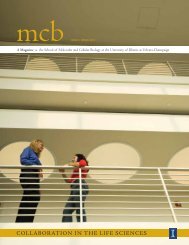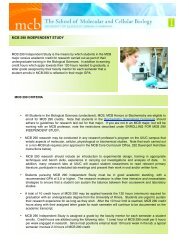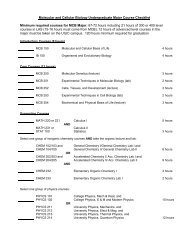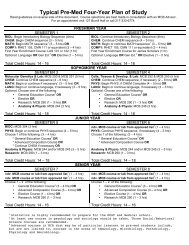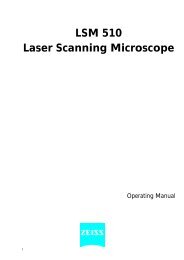breast cancer research • mcb as pre-med - The School of Molecular ...
breast cancer research • mcb as pre-med - The School of Molecular ...
breast cancer research • mcb as pre-med - The School of Molecular ...
You also want an ePaper? Increase the reach of your titles
YUMPU automatically turns print PDFs into web optimized ePapers that Google loves.
facultY PortraIt<br />
M aria Spies<br />
Pr<strong>of</strong>essor Spies accepting the Margaret Oakley Dayh<strong>of</strong>f Award from Biophysical Society<br />
President Henry A. Lester. Image used with permission from the Biochemical Society.<br />
10 . <strong>mcb</strong><br />
With a new award, Pr<strong>of</strong>essor<br />
spies is recognized both for her<br />
accomplishments to date <strong>as</strong> well<br />
<strong>as</strong> exceptional promise <strong>of</strong> future<br />
ground-breaking discoveries.<br />
This year, the Biophysical Society granted Assistant Pr<strong>of</strong>essor <strong>of</strong><br />
Biochemistry and Biophysics Maria Spies the Margaret Oakley<br />
Dayh<strong>of</strong>f Award, a <strong>pre</strong>stigious recognition given annually to<br />
one or two prominent female scientists beginning careers in<br />
biophysical <strong>research</strong>.<br />
Now in its fourth year, Pr<strong>of</strong>essor Spies’ <strong>research</strong> team employs<br />
traditional and single-molecule biochemistry to discern the<br />
role the molecular motors known <strong>as</strong> DNA helic<strong>as</strong>es play in<br />
identifying and repairing DNA damage. <strong>The</strong>se are important<br />
players in maintaining the integrity <strong>of</strong> our genetic blueprint,<br />
which is continuously <strong>as</strong>saulted by UV radiation, toxic<br />
chemicals, and reactive oxygen species.<br />
“DNA helic<strong>as</strong>es act <strong>as</strong> critical components in many molecular<br />
machineries orchestrating DNA repair in the cell,” Spies said.<br />
“Multiple dise<strong>as</strong>es bearing hallmarks <strong>of</strong> <strong>cancer</strong> and aging are<br />
<strong>as</strong>sociated with malfunctions in these enzymes.”<br />
<strong>The</strong> Biophysical Society is not the only organization to have<br />
honored Pr<strong>of</strong>essor Spies in the p<strong>as</strong>t year.<br />
In September, 2009, Pr<strong>of</strong>essor Spies began her six-year appointment<br />
<strong>as</strong> a Howard Hughes Medical Institute (HHMI) Early<br />
Career Scientist. <strong>The</strong> award aims to provide generous funding<br />
to the most promising early career scientists in the country.<br />
According to HHMI, “<strong>The</strong> new program is ai<strong>med</strong> at <strong>research</strong>ers<br />
who have run their own labs for two to six years and are now at<br />
a critical point in establishing their own vibrant, independent<br />
<strong>research</strong> programs.”<br />
HHMI President Thom<strong>as</strong> R. Cech says, “We decided to focus on<br />
scientists who have led their own laboratories for several years<br />
because many <strong>of</strong> these scientists are at a high point <strong>of</strong> their<br />
creativity just <strong>as</strong> they see their start-up funds and early-career<br />
awards ending... It is this period <strong>of</strong> career vulnerability that the<br />
HHMI Early Career Scientist Program aims to bridge.”<br />
Pr<strong>of</strong>essor Spies says this funding will give her <strong>research</strong> not only<br />
stability during this period <strong>of</strong> economic uncertainty, but the<br />
ability to try more cutting-edge, potentially high-impact studies<br />
that might be difficult to get funded by more traditional agencies.<br />
Howard Hughes, she says, intended the award for b<strong>as</strong>ic<br />
bio<strong>med</strong>ical <strong>research</strong>, and it is in that spirit that she intends to<br />
continue.<br />
Most <strong>research</strong> in her lab is currently funded by the HHMI and<br />
the American Cancer Society. She describes the HHMI Early<br />
Career Scientist Award <strong>as</strong> “a great honor.” <strong>•</strong><br />
About the undergrads working alongside post-docs and graduate<br />
students in her lab, Spies says, “these are highly motivated<br />
students driven to scientific discovery. they eagerly take on<br />
<strong>research</strong> projects that l<strong>as</strong>t two or three years and expose<br />
them to all stages <strong>of</strong> scientific discovery from identifying a<br />
question and planning the experiments to writing a paper.”


